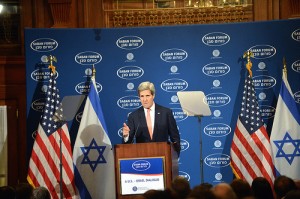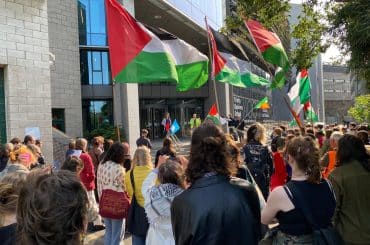
Secretary of State John Kerry said Saturday that Palestinian citizens of Israel are a “demographic threat” to the Jewish state, and the West Bank Palestinian population deserves “state institutions” of its own. This was the secretary’s first indication that Palestinian statehood is not on the table in the current round of peace talks, as he carefully avoided any promise of immediate Palestinian sovereignty.
“After waiting so long for statehood, the Palestinian people deserve effective state institutions,” said Secretary Kerry. “Israel and Jordan must know that they will have a reliable and responsible neighbor – not a failed state – living between them,” he continued.

The remarks were made over the weekend at the Saban Forum in Washington DC, along with a conversation from President Barack Obama, Israeli Foreign Minister Avigdor Lieberman and a closing address from Israeli Prime Minister Benjamin Netanyahu.
With little known about the inner workings of the nine-month-track of direct peace talks between Israeli and Palestinian leaders, Secretary Kerry’s comments on “state institutions” provides some daylight between speculative and probable outcomes. “It will take time to train, build, equip, and test Palestinian institutions to ensure that they’re capable of protecting Palestinian citizens,” he said, continuing, “Their primary responsibility is that – and also of preventing their territory from being used for attacks on Israel.”
In his harshest description to date of Palestinian ethnicity, Sec. Kerry also said Palestinian citizens of Israel are a “demographic time bomb” that threaten Israel’s “future as a democratic, Jewish state,” adding “that today’s status quo will not be tomorrow’s or the future’s.” He went on to support separating the two populations, and demanding the Palestinians recognize Israel as a Jewish state a condition that is “the only way” to achieve peace.
“The only way to secure Israel’s long-term future and security will be achieved through direct negotiations that separate Palestinians and Israelis, resolve the refugee situation, end all claims, and establish an independent, viable Palestinian state, and achieve recognition of Israel as the homeland of the Jewish people,” said Sec. Kerry.
Prior to Sec. Kerry’s remarks the expectation was that negotiations over core issues (borders, Jerusalem, refugees, and water) would lead to a proposal of a Palestinian state. Whether or not that state would then be viable, is the question of critics to the U.S.-brokered deal. But it doesn’t take an analyst or a psychologist to note statehood seems unlikely. The Israeli team have made their redlines clear: no division of Jerusalem along the ’49 armistice border, and no refugee right of return. Speaking the day before, Lieberman reiterated these positions, adding, “I don’t see any occupation” when a questioner asked him about the Israeli Oscar nominated documentary film The Gatekeepers.
“Do you think the occupation is really eroding the fiber of Israeli society,” asked Meena Ahmad, who said the conditions in the West Bank “was the corruption of the soul of Israel.” Lieberman responded that the term “occupation” was a “prejudicial, biased approach to the problem,” adding, “to speak about the occupation is not to understand the history.”
Ahmad’s was the only serious question in the forum. Former White House Middle East adviser and aide Dennis Ross inquired about the Saudi Initiative, which Lieberman flatly rejected because of “the right of return.” Haaretz senior columnist and author of My Promised Land Ari Shavit congratulated the foreign minister on his acquittal for charges of corruption, at which point Lieberman made the dig, “Don’t believe the Israeli press, only the American press.” And the moderator, the Washington Post’s David Ignatius, asked about Iran and potential Israeli isolation, to which Lieberman said, “we are one, small Jewish state and around us is 57 Islamic states.”

Lieberman’s Friday talk came as his first appearance in the U.S. following a one-year hiatus while he was under investigation for fraud. Since re-gaining his post, the foreign minister has been hailed as a new, softer Lieberman. While once associated with draconian loyalty oaths and explicitly calling for the ethnic cleaning of Palestinian citizens of Israel (not to mention a scandal over battering a 12 year old classmate of his son, and a resume that includes night club bouncer and airport baggage handler), at the Saban Forum he reaffirmed his most controversial positions, albeit in a lighter tone.
“Not transfer, but exchange,” said Lieberman. He continued that he hoped to secure the “exchange of lands and peoples,” a euphemism for stripping the 1.6 million Palestinian citizens of Israel of their passport and re-designating them as residents of the West Bank.
Even though Lieberman was amongst a crowd of Washington and Israeli officials familiar with his anti-Arab diatribes, audible gasps could be heard throughout the room when he called to expel Palestinian citizens of Israel. A diplomat from the Russian embassy seated next to me even choked. Another moment of discontent between the plated-dinner audience and Lieberman passed when the foreign minister made a forlorn pun at Sen. Joe Lieberman. Otherwise the foreign minister was amongst allies.
Lieberman also compared Iran to Nazi Germany, stating that the government called Jewish-Israelis “pigs and dogs,” and that rhetoric was tantamount to “Nazi style accusations” that are “more serious than all the movies in Hollywood.”
Speaking Saturday morning, President Obama followed Lieberman’s discussion with a conversation moderated by media mogual Haim Saban (who helped found the Saban Center at Brookings). Saban is a pro-Israel “Influencer” and army funder who has already announced his support for Hilary Clinton in 2016 and is busy fundraising for the Democratic party. The California-based billionaire hosted the president last month for a backyard fundraiser at $16,200 a seat for 120 guests, and is credited for personally persuading Obama to take positions more dedicated to Israel.
“We put in place an unprecedented regime of sanctions that has crippled Iran’s economy, cut their oil revenues by more than half, have put enormous pressure on their currency,” said President Obama who spoke not about Israeli-Palestinian relations, but made a case for a six-month partial lifting of sanctions on Iran in exchange for a commitment to retract the country’s nuclear program. Obama boasted that the nuclear deal would unlock 7 billion in frozen revenue, but overall applied U.S. sanctions costs Iran around ten times that amount every year—and those sanctions would remain in tact.
The President’s limited remarks on Israeli-Palestinian relations pointed to the Kerry-brokered talks producing sanitized Palestinian quasi-autonomy with formal statehood off the table.
“The Palestinians have to also recognize that there is going to be a transition period where the Israeli people cannot expect a replica of Gaza in the West Bank.”
Closing the Saban Forum on Sunday morning, Israeli Prime Minister gave a 30-minute address stating, “Israel and the U.S have formed the ‘indispensable alliance,’” an upgrade from the “special relationship”. He described any headway with the Palestinians during this round of peace talks as “meaningless” so long as Iran remained capable of producing a nuclear weapon. “I don’t think I can overstate the Iranian danger,” he said, continuing that Israel is “threatened like no other country on earth.”
Netanyahu then praised Obama for unprecedented support of Israel, but acknowledged the two have differences over the role of a “superpower and a regional superpower,” suggesting Israel supports a U.S. threat of military force in Iran, rather than diplomatic measures.
Originally Netanyahu was scheduled for a conversation with Charlie Rose. However to much surprise, the format was changed and the prime minister delivered a speech and did not take questions. The Brookings Institution said Rose was removed from the program at the instance of the prime minister’s office. However spokesman for Netanyahu Mark Regev said “not true,” his office “never scheduled any such interview” with Rose.
Last year’s Saban Forum included a conversation with former Palestinian Authority Prime Minister Salam Fayyad. This year no Palestinian speakers participated. Then Secretary of State Hilary Clinton also gave an address advocating “a comprehensive peace between Israel and all Palestinians, led by their legitimate representative, the Palestinian Authority,” reflecting a subtle change in U.S. policy to regard the Palestinian Authority, and not the Palestinian Liberation Organization as the “sole and legitimate representative of the Palestinian people.”
The Saban Forum is “already [having its] 10th anniversary,” said Sec. Kerry over the weekend. “This has become really the premier venue for U.S.-Israel public dialogue.”


— is there video?
Racist comment by Kerry.
Shows that Israel is controlling US policy 100% and that the corrupt Abbas is playing along.
The only question is will Abbas accept the fait acompli and completely betray his people? And once he does, will they accept it? The answers are Yes and No
It’s exactly as if, in 1938, some German-American industrialist held a “forum” in Washington and FDR and Cordell Hull showed up to hear Hitler and Goering. This is making me think that the non-violent approach is a joke. Violence is the only thing that these fascists like Netanyahu and Lieberman and the rest of these zios understand.
Is it now the WHATISIT-S? “We Have Advanced The Indefinite State-like Institutions Transitional Solution”
07 Dec 2013. Kerry gives up. TSS officially declared dead. Bookmarked accordingly for the when, why, and how of the announcement.